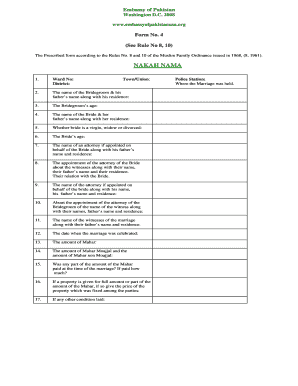

The Government’s position is that people should be free to practice individual religious freedom but that national law will always prevail if it conflicts with religious practices.Īlthough many people benefit from guidance from faith leaders, there is also some evidence which suggests that some religious bodies might be operating in ways that are discriminatory against women, including, for example, women being invited to make concessions to their husbands in order to secure a divorce. Sharia Councils have no legal status and no legal binding authority under civil law. Sharia Councils deal with aspects of Islamic law and offer advice relating principally to marriage and divorce. In a judgment published in February 2020, the Court of Appeal allowed the appeal and held that there had been no ceremony in respect of which a decree of nullity could be granted. In 2018, the Family Court ruled that a Nikah marriage of a specific couple was a void marriage and not a “non-marriage”. This contrasts with the position for “non-marriages” where the parties cannot petition in an English court for a decree of divorce or nullity, and consequent financial provision, if their relationship breaks down, and the court has no power to override the strict legal ownership of property. One advantage of doing so is that, when granting the decree, the court has the same powers to make orders for financial provision as on divorce. Although it is not always strictly necessary to do so, the parties to a void marriage may seek a decree of nullity. The law generally regards parties to a marriage which is not legally recognised as cohabitants, and their marriage as a “non-marriage”, rather than as a void marriage. Legal consequences of unregistered religious marriage The 2018 Independent Review into the application of Sharia Law in England and Wales found that a significant number of Muslim couples do not register their religious marriage as a civil marriage and that, therefore, some Muslim women have no option of obtaining a civil divorce. The husband can end a Nikah marriage by using the “Talaq” procedure, which is not court based, whereas the wife will use a different procedure which usually involves an application to a Sharia Council. This means that their marriage will not be recognised as being legally valid.


Many Muslims in the UK have an Islamic religious marriage ceremony – a Nikah – in an unregistered building and do not have an additional civil ceremony. Islamic marriage and divorce in England and Wales Marriages which take place overseas will be recognised in the UK in specified circumstances. Those who wish to celebrate their marriage in a place of worship, or elsewhere, that has not been registered for marriage must go through an additional civil ceremony in order to be legally married. To be legally valid, a religious marriage (other than marriage according to the rites and ceremonies of the Church of England and the Church in Wales, and Jewish and Quaker marriage) must generally take place in a registered building. This briefing paper deals with the position in England and Wales.


 0 kommentar(er)
0 kommentar(er)
